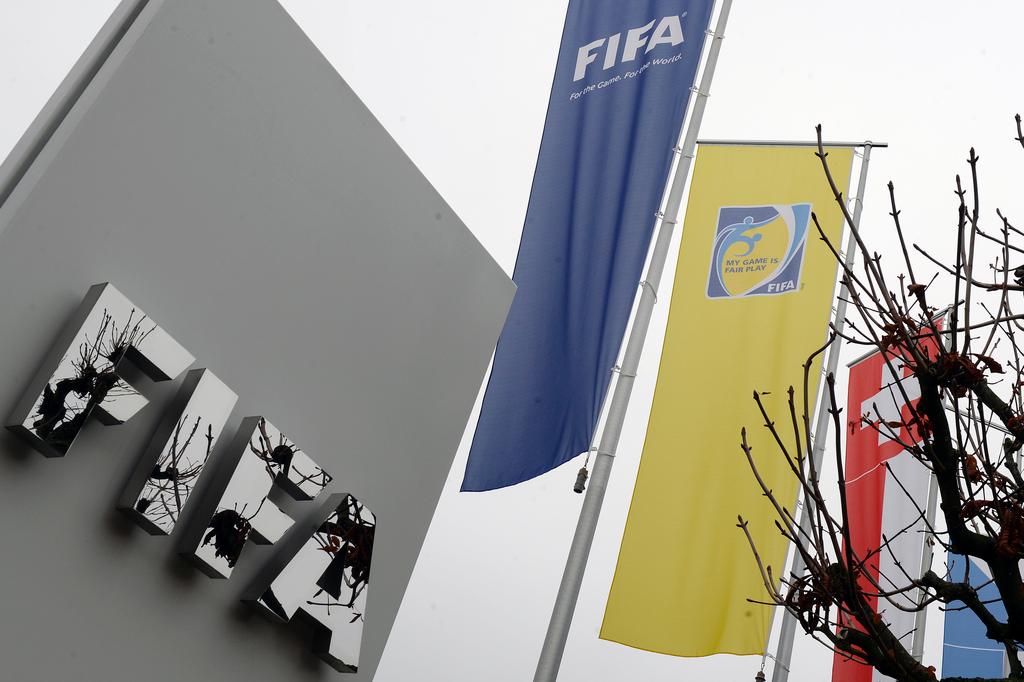
New law brands FIFA, other sports officials ‘politically exposed persons’

Leaders of sports organisations based in Switzerland – like FIFA – will now be designated as so-called “Politically Exposed Persons” subject to corruption investigations. Parliament passed the measure on Friday as part of a larger package of money laundering legislation.
“It’s not perfect, but it’s law,” Roland Büchel, a Swiss People’s Party parliamentarian spearheading efforts to reform sports organisations, told swissinfo.ch after the House of Representatives voted 128-62 to pass the legislation. Ultimately, Büchel found the part regarding Politically Exposed Persons – or PEPs – quite “extreme” because it casts a very wide net.
“It’s not only [FIFA head Sepp Blatter], his secretary and directors who are affected – it’s families and people close to them as well,” Büchel said, adding the legislation would make it “difficult for all these people just to have a normal bank account.”
In reaction a FIFA spokesperson declared: “As FIFA has repeatedly stated in the past, FIFA supports government measures for protecting the integrity of the sport and tackling corruption.”
Büchel, however, feels the legislation didn’t go far enough. Currently, around 65 international sport federations and organisations are based in Switzerland. FIFA, the world governing body of football which has its headquarters in Zurich, is the most high-profile among them. But others, such as the International Olympic Committee (IOC) and UEFA, the European governing body of football, have also been at the centre of corruption scandals in the past. However, the law on PEPs passed Friday doesn’t cover UEFA because it’s technically a European organisation.
“I wanted to get that into the law but failed,” Büchel said. “But that’s not so bad because many of the top people at UEFA are on the committee of FIFA anyway, [and therefore also covered by the PEP law].”
IOC President Thomas Bach, who will be treated as a PEP, said he “wholeheartedly” welcomed the measures.
The IOC will audit its accounts to higher standards than legally required of the organization as well as provide a yearly finance report, including the allowance policy for all IOC members, Bach said.
Response to public opinion
The recent series of sports corruption scandals – including ongoing investigations into the bidding process to host the 2018 and 2022 World Cups – have tarnished public opinion of sports governing bodies.
Recently, some 95% of respondents to an online survey by the daily commuter newspaper 20 Minuten said Blatter should step down to save FIFA’s reputation. All of that negative public opinion – plus bad effects on Switzerland’s reputation abroad – added up to a major crackdown with the PEP law, Büchel says.
“Parliament didn’t want a softer law – a clear majority wanted the tough version.”
However, some parliamentarians, such as Christian Wasserfallen of the centre-right Radical Party, believe the measures go too far and could hurt Switzerland economically.
“FIFA is already doing a lot in the fight against corruption,” he told Swiss Public Television SRF in June, adding that he feared international sports organisations could leave Switzerland in droves if a “Lex FIFA” legislation came to pass. “I could imagine Switzerland will pass some sort of law and then FIFA will say, ‘we don’t have this problem in any other country,’ and they’ll be gone in a flash.”
In recent years, moves have been made at the Swiss government level to improve oversight of sports bodies like FIFA and root out corruption. In particular, the Federal Sports Office 2012 Report on Corruption recommended a series of legal measures which have become known as “Lex FIFA”.
The “politically exposed persons” law passed on Friday as part of larger money laundering legislation is part of that Lex FIFA package. The major part of Lex FIFA – which would make corruption in sport a criminal offence – is currently being examined at the committee level in parliament. The Senate will likely be the first chamber to take up the debate, perhaps as early as the spring parliamentary session.
Sports organisations in Switzerland
The first international sports body to come to Switzerland was the International Olympic Committee (IOC) which has been in Lausanne since 1915.
Canton Vaud, of which Lausanne is the capital, is home to about 20 sports governing bodies. In addition to the IOC, they include the Court of Arbitration for Sport (CAS), UEFA, and the world bodies governing Gymnastics (FIG), cycling (UCI) and volleyball (FIVB).
Among the organisations based elsewhere in Switzerland are the governing bodies of football, FIFA (Zurich), basketball (Geneva), handball (Basel), ski (Oberhofen, canton Bern) and ice hockey (Zurich).
Switzerland is attractive for many reasons: its geographic location, highly qualified work force, political stability, neutrality, security, quality of life, plus an attractive tax regime and legal code.
Sports bodies based in Switzerland enjoy association status. Associations are not obliged to register with the state nor to publish their accounts. They are granted tax breaks and flexible legal terms that allow them to govern their own affairs and are exempt from Swiss anti-corruption laws.
A study published at the end of 2007 put the spin-off for the Vaud economy from all these sport bodies at 1,400 jobs and SFr200 million annually ($196 million).

In compliance with the JTI standards
More: SWI swissinfo.ch certified by the Journalism Trust Initiative
































You can find an overview of ongoing debates with our journalists here . Please join us!
If you want to start a conversation about a topic raised in this article or want to report factual errors, email us at english@swissinfo.ch.